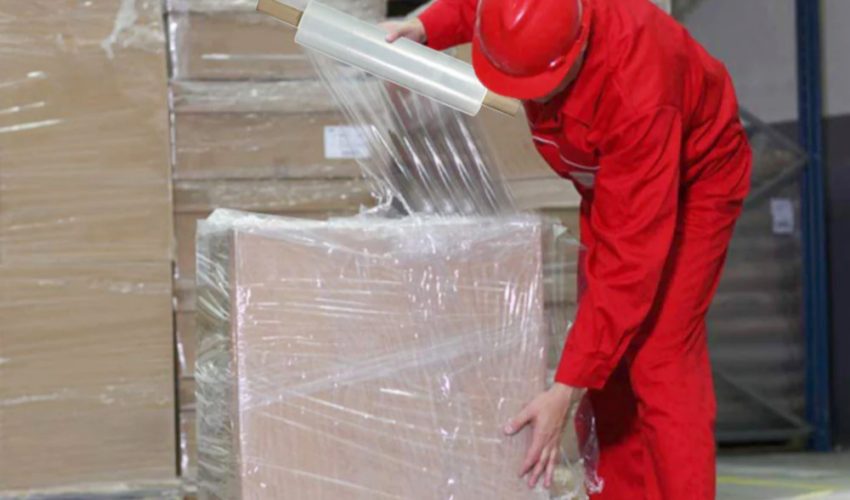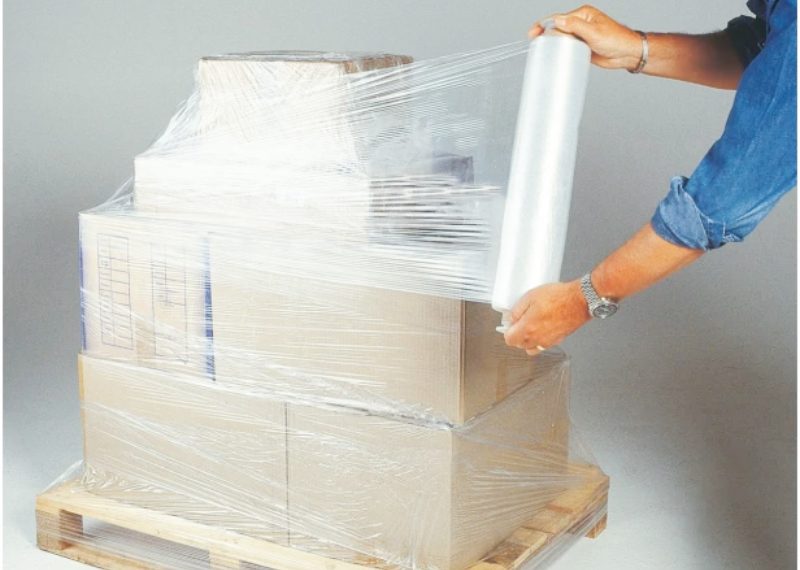
A plastic wrap roll is a versatile packaging material used across a variety of industries. Protect your items with durable, stretchable plastic wrap rolls. Ideal for moving, packaging, and securing belongings during transport. This thin, stretchable film is typically made from polyethylene and is designed to cling tightly to surfaces, providing a secure seal. Packing cling wrap is often used in the same way, especially in the moving industry, to secure furniture and household items, preventing scratches and damage. Both types of wraps help protect goods from dirt, moisture, and tampering during storage or transportation. Additionally, plastic wrap plays a crucial role in food storage, as it keeps items fresh by protecting them from air and contaminants. Whether for packing, moving, or preserving food, a plastic wrap roll or packing cling wrap is an indispensable tool.
Plastic wrap rolls are essential tools for packing and organizing items efficiently, especially during moves or shipments. The stretchable nature of the plastic wrap allows it to tightly conform to various surfaces, providing an excellent protective layer. Plastic wrap roll for luggage is particularly useful for securing bags, protecting them from dirt, moisture, and theft during travel. By simply wrapping a plastic wrap roll or bulk plastic wrap around boxes, furniture, or other belongings, you can secure them for transport, preventing damage and keeping items neatly in place. This versatile material is commonly used by individuals, businesses, and logistics companies for everything from packing household goods to organizing pallets in warehouses.
Using a plastic wrap roll offers several advantages when packing and organizing items:
When it comes to moving and storage, using a plastic wrap roll provides an effective, low-cost solution. Plastic wrap rolls are often more affordable than traditional packing materials like bubble wrap or packing peanuts. Their ability to conform to various shapes ensures that less material is needed to protect items. This means you can pack more efficiently while keeping costs low. White plastic wrap, with its opaque finish, also adds an extra layer of protection by shielding items from dust and UV rays. Furthermore, the lightweight nature of plastic wrap means that it won’t add unnecessary weight to your shipment, helping to keep shipping costs down.
Plastic packing wrap is a specific type of plastic wrap used primarily for packaging items to protect them during transport. It is highly stretchable and sticky, allowing it to tightly adhere to surfaces, similar to PVC shrink wrap roll, which provides a secure, tight seal for enhanced protection of goods during shipping.
A heavy-duty plastic wrap roll is a stronger, more durable version of the standard plastic wrap. It is designed for tougher jobs, such as securing heavy or bulky items.
Plastic wrap film is another term for the same material used in plastic wrapping film roll but often refers to a thinner version typically used for smaller or lighter items.

Heavy duty plastic wrap rolls are designed for tougher, more demanding packaging tasks, offering extra strength and durability. These wraps are ideal for securing large, heavy, or bulky items, as well as pallets of goods that need added protection during transport or storage. The thick, stretchable material provides superior resistance to tears and punctures, making it the go-to choice for industrial and commercial applications. A heavy-duty plastic wrap roll is essential for keeping items intact and safeguarded from external elements such as moisture, dirt, or damage caused by rough handling.
Heavy-duty plastic wrap rolls are used in a variety of settings, where their strong, tear-resistant qualities are essential. Some of the most common applications include:
Heavy-duty plastic wrap rolls offer significant advantages when it comes to protecting valuable items during transport, storage, or long-term handling:
Plastic packaging wrap is used in both industrial and retail environments to secure and protect products during transport or storage. It’s similar to the standard plastic wrap but often comes in larger rolls and thicker gauges for industrial-scale applications.
Plastic wrap for individual products is essential for ensuring items are secure, clean, and intact during transport. It is a popular choice for wrapping both small and large products, providing convenience and effective protection.

When comparing stretch wrap and plastic wrap rolls, it’s essential to understand how each material is designed and the best uses for each. Both are made from plastic, but their applications, strengths, and purposes can vary significantly. While both types of wraps are highly versatile, they have key differences that make one better suited for specific tasks. A plastic wrap roll is typically thinner and used for covering food or smaller items, while stretch wrap is stronger and designed for securing heavier or bulkier objects, such as pallets.
Wrap plastic film is a highly flexible and stretchable material, used primarily for large-scale packaging and industrial applications. It is similar to stretch wrap but is often produced in bulk for business or shipping purposes. This type of plastic film is highly durable and can be used to wrap pallets, machinery, and other large products to ensure their safety during transport.

Finding a plastic wrap roll nearby can be essential, especially when you need it quickly for moving, packing, or food storage. Local stores, such as hardware shops, office supply stores, and grocery stores, often carry plastic wrap rolls in different sizes and strengths for immediate use. When purchasing, considering the wrapping plastic roll price is important, as costs can vary based on thickness, adhesive quality, and durability. Comparing prices across suppliers ensures you get the best value without compromising on the quality needed for secure packaging.
When searching for plastic wrap rolls near you, there are several avenues you can explore to find the right type and size for your needs:
When purchasing a plastic wrap roll locally, there are some important factors to consider to ensure you get the right product for your specific needs:
Selecting the appropriate plastic wrap roll for your needs is crucial for ensuring efficiency and effectiveness. Choosing the wrong type or size may result in waste, poor protection, or unnecessary expense. Consider the following:
Plastic wrap is a great solution for protecting furniture, particularly chairs, during a move or while in storage. Wrapping furniture with plastic helps shield it from dirt, dust, and damage, ensuring that it remains in good condition until it reaches its destination.
Packing plastic wrap is another essential item that helps ensure your belongings are safe during transport or while in storage. Whether you’re wrapping up personal items or large shipments, knowing where to find reliable sources for packing plastic wrap can save time and money.
“Plastik Wrap Perabot” refers to the practice of using plastic wrap to protect furniture, especially in moving or storage situations. This term is particularly relevant when discussing the use of plastic wrap to secure furniture items like couches, tables, and chairs. For those considering long-term storage, plastic wrap for furniture storage is an ideal solution.
Plastic films come in various forms, each designed for specific purposes in industries like packaging, food storage, and shipping. The most common types of plastic films include PE plastic film and commercial plastic wrap rolls, each with unique properties to suit different needs.
There are several different types of plastic film, each tailored for specific functions, including food packaging, shipping, and industrial use. Some of the most popular types are:
PE plastic film is made from polyethylene, a highly flexible and durable plastic material. It is widely used in a variety of applications due to its cost-effectiveness and ability to protect goods from moisture, dust, and damage during transport. Common uses include:
A commercial plastic wrap roll is a heavier-duty version of plastic wrap used in industrial and logistics settings. This stretchable plastic film is primarily used for securing large loads, such as pallets or bulky shipments. It offers excellent stretchability, strength, and durability, making it the ideal choice for protecting goods in transit. Benefits of commercial plastic wrap rolls include:
Stretch Ability of Plastic Wrap refers to the extent to which plastic wrap can elongate or stretch without breaking. This property is crucial for the functionality and performance of plastic wraps, especially when used for wrapping items, sealing products, or in food storage.
Here are the key aspects of stretch ability:
Stretch ability is a vital characteristic of plastic wrap. It determines how well the wrap can conform to different shapes, cover larger areas, and provide a tight, protective seal. The greater the stretch ability, the more versatile and effective the plastic wrap is in various applications.
Wrapping plastic is commonly referred to as “plastic wrap,” “cling film,” or “stretch film,” depending on its specific use and properties. The most popular term is plastic wrap, which is widely used for wrapping food, protecting items during moving, and securing goods for storage or shipment. This thin, stretchable plastic film adheres to surfaces and is designed to cling tightly, providing a protective barrier against air, moisture, and contaminants. Plastic wrap is commonly made from polyethylene, a type of plastic known for its durability and flexibility.
Stretch film, a variant of plastic wrap, is primarily used in industrial settings to wrap larger items, such as pallets or machinery. It offers a higher level of stretch and strength, providing a tighter and more secure hold. Cling film, on the other hand, is often used in kitchens for wrapping food items, thanks to its excellent cling properties and ability to create an airtight seal that helps preserve freshness.
Yes, you can wrap a tree in plastic wrap, but it depends on the purpose and the type of tree. Generally, wrapping a tree in plastic wrap can have both positive and negative effects, so it’s essential to consider your objective.
If you’re protecting the tree during transportation or to prevent pests from reaching it, wrapping can be beneficial. For example, if you’re moving a young tree or sapling, plastic wrap can help keep its roots intact and shield it from potential damage. However, it is important not to wrap the plastic too tightly, as this can restrict air flow and moisture, potentially suffocating the tree or causing damage to its bark.
On the other hand, wrapping a tree in plastic for prolonged periods is not usually recommended for outdoor trees. Trees need to breathe and get sufficient airflow, and wrapping them too tightly can create a humid environment that encourages the growth of fungi or mold. Additionally, it can trap excessive moisture, which can lead to rot or disease. For mature trees, it’s typically better to use methods like mulching or other protective materials that allow for more airflow and moisture control.
If you intend to protect a tree from frost or extreme weather, consider using specialized tree wraps designed for that purpose, as these allow for better ventilation and moisture regulation.

My name is James Thompson, and I’m the editor of this website dedicated to Stretch Film, Pallet Wrap, and Stretch Wrap products.
My passion for packaging began when I noticed the challenges companies face in securing their products efficiently for transportation and storage. This inspired me to delve deep into the world of stretch films and pallet wraps, exploring the latest technologies and best practices.
I aim to provide valuable insights, practical tips, and up-to-date industry trends to assist you in making informed decisions. Whether you’re a small business owner or part of a large corporation, my goal is to support you in optimizing your operations and ensuring your products reach their destination safely.
Thank you for visiting, and I look forward to accompanying you on your journey toward better packaging solutions.
Comments are closed